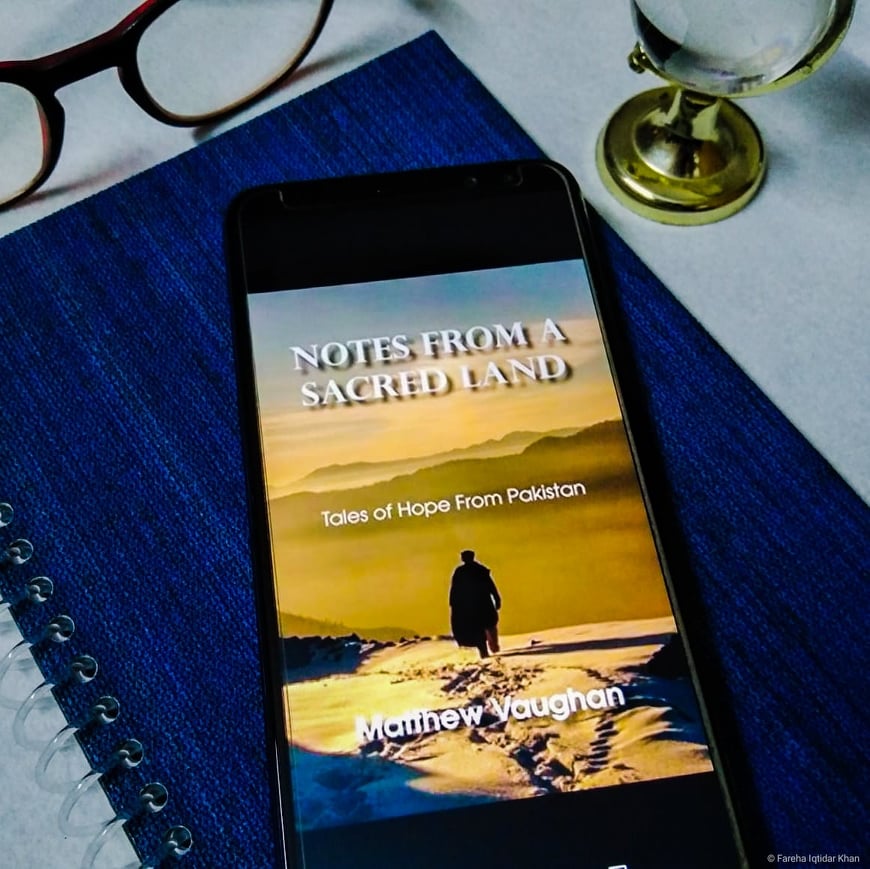|
Vaughan, Matthew. Notes from a Sacred Land: Tales of Hope from Pakistan, Print Master: Islamabad, 2017. 164 pages. About the Author:Matthew Vaughan is a British citizen working for a Christian charity in Pakistan. He moved to Pakistan in 2011 with his family. The book presents his personal account regarding those aspects of Pakistan that have generally not been highlighted in the available literature about the country. Given the international news media coverage, the author held preconceived notions about Pakistan, which soon dispelled as he landed for work in the country. The author explains how it turned out to be an exceptional country offering unrivaled hospitality, generosity and exquisite natural locales. The book comprises of twenty anecdotes, encompassing the experience of the author in the country. The news originating from the country usually reports violence, hostility and turbulence. The book opens with an emphasis on the general humanness and hospitality of Pakistanis, a quality that took the author by surprise. Pakistan is a country of perplexing paradoxes. For starters, there is the obvious economic divide among the people. Some delving in riches, while others unable to make both ends meet. On one hand are those who have no access to basic education and on the other hand are swarms of people that attend literary festivals with fervor. However the most disconcerting disparity is that between the tranquil splendor of its land and the instances of cruel viciousness that the people face every now and then, that is the toughest to tolerate. Even in the case of any such unfortunate incident, Vaughan highlights the resilience and tenacity of the inhabitants of the land. After any such instance the people come out stronger and hopeful for a better future. The culture of charity despite the low per person income in the country, is astounding. Charitable giving or ‘Zakat’ is one of the integral parts of the faith of the majority population. It leads to the collection of millions of dollars yearly by the government. Private charity giving is also very commonplace. The country is home to many charitable organizations working privately. The country and its people are much diverse, remarkable and generous than the popular sentiment held about Pakistan in the world. Hospitality and kindness is the general outlook of the people, primarily when it comes to dealing with an outsider to the country. Vaughan discusses various acts of altruism by the general public that he experienced regularly. Such actions ranged from people declining to charge him money for the purchase of a product or service, on the grounds that the author was a guest, to deeds of random kindness by complete strangers. Being a charity worker, the author had many opportunities of visiting downtrodden households, where he was taken aback by the warm welcome and hospitality of the inhabitants despite their meager resources. Pakistan hosts a massive number of refugees, as notes Vaughan. The country comes only second to Turkey in its eagerness to host refugees. Lebanon, Iran, Jordan; all Muslim nations, all closely follow Pakistan in this regard. Vaughan notes that the West peculiarly evades reporting such information since this display of tolerance and cordiality does not go along the Western account of Muslim fanaticism. Besides, Pakistan’s inability to address its own poverty needs to be seen in the context of the numerous refugees that have found shelter in the land. The land is more heterogeneous and diverse than is generally believed by the world. Many faiths and cultures exist peacefully. Many formal and informal organizations and set ups are made to advance inter-faith and inter-cultural harmony. Besides, the land is blessed with exceptional geographical setting and landscape. Particularly the northern areas easily stand out as a tourist attraction that can in turn contribute to the economic growth of the country. Positive and negative conditions co-exist in the country, as pointed out by the author. However, there are many people in the land who have taken it upon themselves to do something productive about their unfortunate condition. Master Ayub is one of such hopeful people. He has been teaching underprivileged children for the last three decades, for free. Vaughan considers Pakistan as “one of the most unjustly maligned countries of the world.” Given the measure of chaos of Pakistan’s independence, and the British role in that scenario, the author; a British national, is confounded at receiving no resentment at the hands of the Pakistani people. In a period of rising friction between Pakistan and the West, “Notes from a Sacred Land” restores faith in the people and society of Pakistan and humanity in general. The book is a “call for peace building” and accolade for the masses of the country.
0 Comments
Conferences are, by design, highly stimulating situations that may deplete one’s energy rapidly especially if they identify as an introvert. Many of my students and professional acquaintances think of me as an extrovert. However, being an introvert, such socialization is possible for me only with a lot of down time for recharging, through reading, writing and other solitary activities. Attending an academic conference on my own was a steep learning curve to say the least. I got to learn a lot about myself, how I navigate the world, how I perceive things and how others may perceive me. The following worked for me: Be Proactive One thing that always helps a person stay at the helm of affairs is to be proactive. Introverts are usually good planners. Utilize that quality for your potential benefit. Having been prepared keeps the anxiety of being at a new place in check. Look into the conference schedule. If a topic specifically piques your interest, keep relevant questions in mind to ask during Q&A session. Find “like-vibe” people Connecting with many attendees can be an uphill task. It is best to stay true to who you are as a person. Rather than socializing with everyone, pick a few attendees that match your vibe. Ask questions about things that actually interest you. Excuse yourself from icebreakers: The rest of the conference would allow enough engagement. Do not force yourself to sit through icebreakers. They may get very awkward, very fast. Take a time-out: Taking regular breaks can be useful to ease your nerves. Know that it is just a time out. Do not consider it an escape. Look for a peaceful and confined space to recharge your batteries. I, for that matter, found solace in a secluded prayer area. You might want to skip conference lunch and sneak-out to grab a bite elsewhere. Don’t forget ear plugs & headphones Then there are certain things which introverts know from their daily experiences. Ear plugs can be sanity-savers when you cannot escape the situation and need to stay put; but can no longer stand further auditory input. A more acceptable alternative would be to bring along your headphones. Skip a session: Back to back sessions for many consecutive days gets exhausting anyway. More so, if your energy drains quickly in large congregations and crowded places. Have a look at the conference schedule. If the title of any session suggests that you are either already aware of the topic, or not much interested, its alright to give it a pass. Get adopted by an extrovert: As an introvert, you might be well-acquainted with situations where a good-hearted extrovert ends up taking you under their wings. They string you along everywhere. Even then, it is better to communicate your boundaries. |
AuthorA lecturer and lifestyle consultant by the day; an avid reader and writer by the night, I am a student of life. Archives
March 2024
Categories |


 RSS Feed
RSS Feed